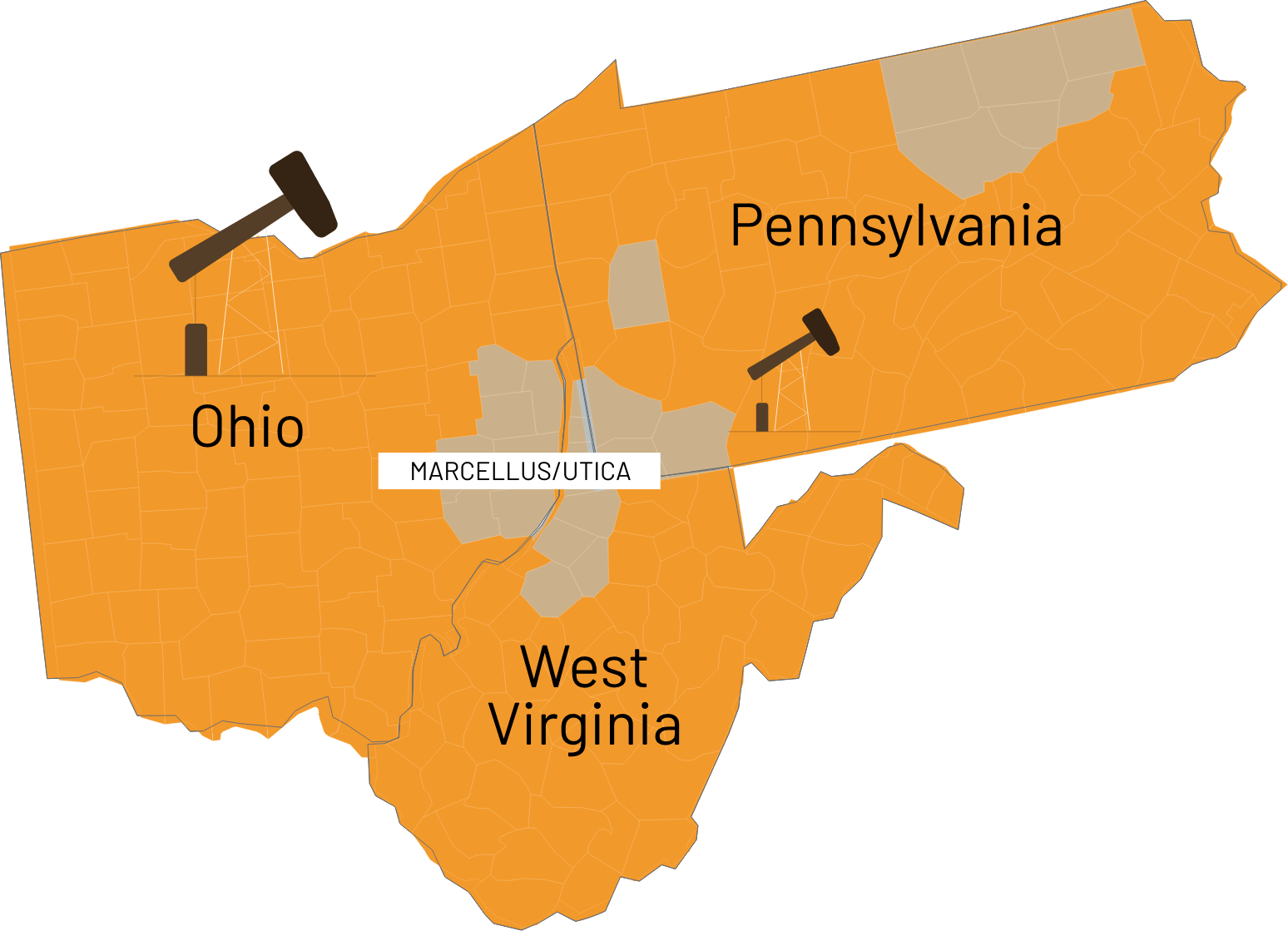Mineral rights give ownership, for a specified time, of the underground minerals that do not include sand, limestone, gravel, or subsurface water. If the mineral rights to your property have been sold before you acquired the land, that means you own only the surface rights and cannot use the minerals. If the mineral owner wants to extract and use their minerals, they form a case to request unrestricted access to the minerals on the site, in which case, the landowner is obliged to give access.

Mineral Rights in West Virginia go way back to the time when the first Indians were present in West Virginia and mining rocks. Historic information shows that Native Americans used to form natural gas vent burning springs and their oil and gas industry started as a result of salt mining.
In 2021, with the rise in the value of mineral rights, West Virginia has become a popular place for people to buy West Virginia minerals for the royalties attached. Without all the pertinent information, many mineral owners could end up with less money and more problems if they don’t take proper advice before selling or leasing their oil and gas mineral rights. With that said, let’s look at how mineral rights in West Virginia work and the essential information needed to make an informed decision.
Mineral owners in West Virginia don’t purchase the site alone. Like other oil and gas producing states, mineral rights are sold differently from surface rights so you may have to enquire about the land use and mineral rights from a legal point of view before completing any form or contract for purchasing West Virginia mineral real estate in the area, which can be a long process.
West Virginia mineral rights are complicated because they can be split among several owners or within a family, each earning royalties and each being liable to pay tax on their rights. Many who do not pay those taxes lose ownership to the government eventually, even if they didn’t know they were obliged to pay taxes.
Unlike mineral rights, surface rights are those that cover every part of the plot above the ground, and its use. These rights include the structures on the site and permission to use or farm the area or own above-ground resources, including plants, trees, and water on the site.
With this right, you may use the land as you please, and can even dig to a certain depth to install a septic tank. With your surface rights, you can lease or sell the surface rights alone, but nothing concerning the drilling and mining of oil and gas resources beneath. If you know the legal status, then your surface rights can be enough.
In 2021, a judge from the state’s supreme court of appeal declared that mineral owners have no claim to the surface owner’s land to extract minerals. This case and ruling were related to the several conflicts and issues that have happened between the mineral owners and the surface rights owner.
Therefore, when the interest of the mineral owner and that of the surface rights owner clashes due to exploration and extraction activities, the mineral rights owner now has to ask for adequate permission to cover every aspect of their activity that will occupy the above-ground area on the site.
While many people know their local landowners or who is in charge of giving access to the site, such ownership is not fully defined for all families. In many families, there’s debate over the owners of mineral rights or surface rights. You can use the local authority website to find the general information in the state and county records. Here is a breakdown of the general steps to follow when doing a website search for mineral rights records.
On the website, you can submit a request form to review the state/county records or tax collection documents through a deed search at the county records office. This will provide insight into the ownership history over the years. In general, the deed will not project the property mineral rights or mining resources directly so you will have to do more research on the owners of West Virginia minerals. There are various local website resources available for this. You can also check the county royalty offices to see who’s collecting the oil and gas royalties on the property.
You can contact various companies or individuals to handle this non-general research who charge you a small fee for their help. The fee is worth the service as they carry out a professional search of the state and county records.
When you inherit mineral rights in West Virginia from their owners, you have to go through a short probate period within which you can get the mineral rights transferred to you by the will executor according to the legal processes in force. To transfer the rights, the insurance company and an attorney will make a title search to ensure the deceased person (mineral rights owner) had legal rights to the oil/gas/minerals.
If the oil/gas/mineral owner’s rights pass all checks and are not on any current lease then they can be transferred to your name successfully and a new county or state record will be created under your name in a legal form.
To claim the West Virginia mineral rights, here are the necessary steps to take. After confirming your legal ownership with an attorney at law, you need to draw up a deed of transfer form in your name and register it with the county records office as the mineral owner.
The land transaction, leasing transaction, and royalty compliance go through the county office. To conduct any of these services, you have to go through them.
This organization will help you conduct your royalty ownership issues and help transfer the rights to the oil/gas royalty payment streams to you.
The government of West Virginia has decreed that all types of mineral interests be taxed the same as your home. According to the law, mineral rights owners will pay 60% of the value of the mineral rights interest as tax to the county. The value is set based on West Virginia Code procedures and remains the same for each county.
However, you should note that the value for your tax changes the day you start drilling and mining and will be calculated on several factors that include the discount rate, yield capitalization, well expenses, decline rate for well, and producing formation. The number of wells on the site is appraised separately under West Virginia law.
The severance tax is a tax generated from oil and gas extraction in Louisiana. The tax rate is based on the choice of the state government and the extracted minerals. However, the severance tax differs according to mineral resources, and what landowners pay on oil/gas can provide a significant revenue source for Louisiana.

Figuring out the value of mineral rights can be challenging as it’s impossible to get the accurate value due to factors such as differences in mineral rights interests. This makes it impossible to get the average price of mineral rights per acre.
To get the accurate value of the mineral rights in West Virginia, we need to put all factors into perspective as each factor plays a significant role in the value of the rights. The best way to estimate mineral rights is through existing offers as they provide the buyer with the opportunity to get a ballpark feel of the rights’ value.
A lease for mineral rights is an agreement that allows mining companies to get to work and determine if the soil holds the correct minerals, and in sufficient quantity. To acquire leasing mineral rights, companies will pay the property owner to reserve the property for a period. If the company finds the minerals they seek, they can continue to mine but if they don’t find the minerals before the lease expires, then the rights to the property revert to the owner.
Knowing the value of non-producing mineral rights is not possible because of the uncertainness of the cash flow from mineral extraction and mining companies. The risk associated with non-producing wells makes it complicated to come up with figures.
However, to get the rights value, we have to go with estimates but bear in mind that the cost of the rights could be very high as prices could fluctuate before production commences.
For producing mineral rights, the current value would be based on the value of future cash flow for mineral extraction and mining companies. The rate of the future cash flow would be determined immediately after production begins. So, there is no particular cost until production begins on a property.

The rights to mine minerals and drill for oil and gas in West Virginia can be bought by individuals, not just companies in the oil/gas industry. However, due to the uncertainness of such mineral resources in the ground, the buyers may negotiate to pay a smaller release fund for a lease first before an outright buy.
The lease gives the buyer the right to explore the potential of the property for drilling and mining of oil and gas. If the oil and gas found is of marketable quantity, then the buyer may go further by making the lease a permanent deal.
Most people may not be able to handle the buying or leasing process due to the number of steps and amount of information involved. You can contract your acquisition project to good brokers like Pheasant Energy, experienced brokers who can get the best deal for you. All you will need to do is sign the document and take over the land.

Selling your West Virginia mineral rights depends on the choice of the mineral rights holder. When you sell the rights, you have to live with the consequences that the buyer can exploit the property whenever they please.
The new buyer may not be active in the oil/gas industry and have no intention of producing oil and gas. They may just want to own the interests as an investment and sell the oil and gas mineral rights later to the company of their choice which will assume production. At this stage, people known as middlemen can reserve the right to purchase the property and broker it to oil and gas drilling companies in the industry.
One such agent is Pheasant Energy, a trustworthy property broker that can purchase a property from you as an investment to sell later in the future. They offer some of the best prices and ensure that deals are completed efficiently.
Transferring legal mineral rights from one person to the other is a simple process but can take a long time because of the necessary checks needed regarding the mineral rights in each case. When you want to receive mineral rights, either given or sold to you, a title search of the property must be made to ensure that whoever is selling or transferring the property to you has the legal right in the first place.
Normally, insurance companies or attorneys conduct such searches. If the property has a current lease on it, you may have to wait as that means at some point, the oil and gas mineral resources were leased out in exchange for some type of compensation. However, if the property is clear of any lease, the property can be transferred to your name and you would collect the royalties it affords.
Remember that when the property interests get transferred to you, you have to register the property with the county records office as the new property holder, so you can become entitled to the royalties involved.

Currently, Pheasant Energy operates in:
These parishes are part of the Utica Basin. Pheasant Energy offers quality service, advice, and information to individuals and those active in the oil/gas industry, so you can contact the firm and use them if you wish to do business in any of these areas.
Yes, you own the West Virginia mineral rights to properties wholly when you complete the purchase order form from the owner. In such a case, the land does not return to the owner at some point as it does in some states or under county law in some cases. You take full control of the property forever.
75+
1000+
100K+
Simple Steps
Give us a call at (817) 251-8282 or use our form in order to take the first step towards getting your offer.